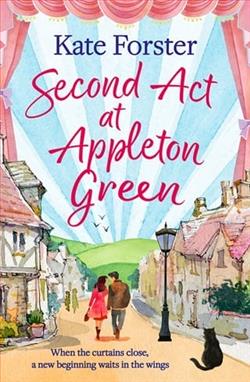Martial Peak Reviews
Kate Forster's Second Act at Appleton Green is a heartwarming tale that explores themes of self-discovery, healing, and the power of community. Set against the idyllic backdrop of Appleton Green, the novel invites readers into a world where dreams are rekindled, and new beginnings are possible, even when life takes unexpected turns.
The story follows Lily Baxter, a talented West End hopeful whose dreams are shattered when she loses her voice before a crucial audition. In a moment of vulnerability, Lily retreats to her grandmother Violet's cottage in Appleton Green, a place that has always offered her solace. This setting serves as a perfect contrast to the bustling life of London, highlighting the novel's central theme of finding peace and clarity away from the chaos of ambition.
Forster's portrayal of Lily is both relatable and inspiring. As a protagonist, Lily embodies the struggles of many young adults who face the daunting task of redefining their identities when life doesn't go as planned. Her journey is one of introspection and growth, as she navigates the complexities of lost dreams and the pressure of societal expectations. The author skillfully captures Lily's internal conflict, making her a character that readers can empathize with and root for.
Violet, Lily's grandmother, is another standout character in the novel. Her warmth and wisdom provide a comforting presence throughout the story. Violet's own quiet struggles add depth to her character, making her more than just a supportive figure in Lily's life. Her subtle guidance and unwavering belief in Lily's potential serve as a reminder of the importance of family and the healing power of unconditional love.
The introduction of Nick, the charming local nurse, adds a layer of romance to the narrative. His encouragement for Lily to join the village's amateur dramatics group is a pivotal moment in the story, as it reignites Lily's passion for the stage. The chemistry between Lily and Nick is palpable, and their budding relationship is portrayed with a refreshing authenticity. Forster avoids the clichés often found in romantic subplots, instead opting for a more nuanced exploration of love and companionship.
The amateur dramatics group in Appleton Green serves as a microcosm of the larger community, showcasing the novel's theme of belonging and support. Through script readings and prop-painting parties, Lily finds herself embraced by a group of individuals who share her love for the arts. This subplot not only provides comic relief but also underscores the importance of community in overcoming personal challenges. The camaraderie and shared passion among the group members highlight the transformative power of collective creativity.
As the story unfolds, Forster expertly weaves together the various narrative threads, culminating in a satisfying and emotionally resonant conclusion. The impending opening night of the village play serves as a metaphor for Lily's own journey towards self-acceptance and fulfillment. The decision she faces—whether to return to the bright lights of London or to embrace a new life in Appleton Green—reflects the universal struggle of choosing between ambition and contentment.
Forster's writing is both evocative and accessible, drawing readers into the world of Appleton Green with vivid descriptions and engaging dialogue. Her ability to balance humor and poignancy is commendable, making the novel a delightful yet thought-provoking read. The pacing is well-executed, allowing for moments of introspection without sacrificing narrative momentum.
In comparison to similar stories, such as Jenny Colgan's The Bookshop on the Corner or Jojo Moyes' The Giver of Stars, Second Act at Appleton Green stands out for its focus on the healing power of the arts and the importance of community. While Colgan and Moyes explore themes of self-discovery and new beginnings, Forster's novel delves deeper into the transformative impact of creative expression and the support of loved ones.
Overall, Second Act at Appleton Green is a beautifully crafted novel that resonates with readers on multiple levels. Its exploration of themes such as resilience, love, and the search for identity is both timely and timeless. Forster's characters are richly developed, and their journeys are portrayed with authenticity and grace. This novel is a testament to the idea that sometimes, the most profound transformations occur when we least expect them, and that the second act of our lives can be just as fulfilling as the first.
For those seeking a story that offers both escapism and introspection, Second Act at Appleton Green is a must-read. It is a reminder that even in the face of adversity, there is always hope for a new beginning, and that the support of a loving community can make all the difference.





![[VS]](/upload/pic/manga/-vs-.jpg)


















Reviews 0
Post a Reviews: